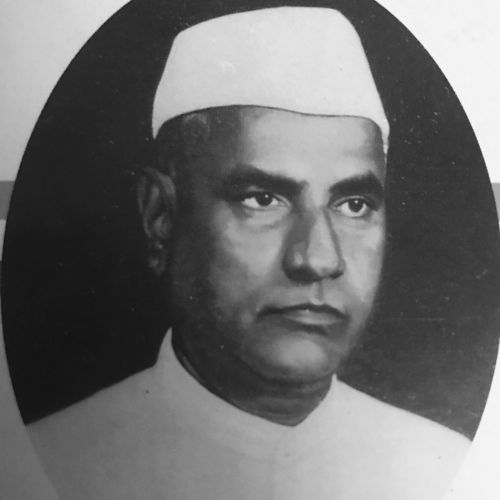Early Life
Keshavrao Jedhe was born on 21 April 1896 as the youngest of four brothers in the deeply influential and wealthy Jedhe family of Pune. The family ran a brass factory and were actively involved in the political and social movements of the region.
Keshavrao did his school education from Poona Municipal School, Poona Highschool and the Poona New English School. In 1918 he began his intermediate studies at Fergusson College, Pune but after 2 years discontinued his studies owing to his greater interest in social movements. For a short while he took up teaching at the Shivaji Maratha Highschool in Pune.
Role in India’s Independence Movement
Jedhe’s political activities were massively influenced by his family’s role in Maharashtrian politics. The residence of the Jedhe family, called the ‘Jedhe Mansion’ was the centre of many social reform movements and the meeting ground for non-Brahmin political leaders. Jedhe was a strong Maratha leader who was involved in the non-Brahmnin movement of the region and was the primary anchor of Jotirao Phule’s Satyashodak Samaj in the early 20th century. Scholar Gail Omvedt described him as a militant Satyashodak leader.
He was ideologically and politically opposed to Tilak and similar orthodox traditionalists of Maharashtra. He organized the Chatrapati Mela as a mark of protest against Tilak’s Ganpati festival, where non-brahmins and educated women were often slandered. Jedhe’s Chatrapati Mela brough together young men from marginalized castes and non-Brahmin communities. Songs composed by Jedhe were popularly played throughout the Mela. These were often highly critical of the Hindu Mahasabha, valourized Shivaji, contrasted Hindu religion against the ‘Brahmin Dharma’ and threw strong attacks against the caste system.
In the later part of the 1920s, he took part in peasant movements, began organizing them and attempted to address their concerns. He supported the Bardoli Satyagraha where peasants protested against increased taxes, and held a huge conference for the peasants in 1928. His anti-caste politics pushed him to participate passionately in the Mahad and Parvati Satyagraha.
He was elected to the Poona municipality in 1925. He was a member of the Central Legislative Assembly. By 1927 he was more interested in the national movement led by the Congress and became less active in the work of the non-Brahmin Party, particularly upset by the pro-government leanings of many of its leaders. Jedhe began his involvement with the Maharashtra Congress in the 1930s. He was elected President of the Maharashtra Pradesh Congress Committee in 1938 and 1946. In 1948 he left the Congress and founded the Peasants and Workers Party (PWP). For his nationalist activities, Jedhe was imprisoned for almost four years.
Contribution to Constitution Making
Jedhe was elected to the Constituent Assembly from the Bombay province on a Congress Party ticket. He did not speak much during the Assembly proceedings. But he was a strong supporter of the formation of linguistic provinces. He supported resolutions in the Assembly that were moved with the specific demand of forming linguistic provinces and redistributing territory.
Later Contributions
Jedhe stood for the 1952 Lok Sabha election as the PWP candidate but lost the elections. Following this defeat, he left the PWP and returned to Congress. In 1958 he won the Lok Sabha elections as a Congress candidate.
He passed away on 12 November 1959.
Key Writings
Jedhe began and successfully ran newspapers like Jansatte, a Marathi weekly paper and ‘Shivsmarak’, another weekly.
- Jedhe was worried that the country would have a dictatorial rule instead of a democracy as the Constitution gave enormous power to the Centre, especially the President.
- He was disappointed that the new Constitution did not bring into existence a Marathi-speaking province called ‘Samyukta Maharashtra’ and hoped for the future creation of such a State.
- Keshavrao Jedhe Charitra by Y.D. Phadke (Keshavrao Jedhe Foundation, 1982)
- Bahujan Samajateel Karmaveer by Prof. Dattatray Sakharam Darekar (Saket Prakashan, 1944)
- Keshavrao Jedhe: a Non-Brahman Nationalist Political Leader by Vijay Nalawade (Shivaji University, 1984)
- देशभक्त केशवराव जेधे माहिती पट by Deshbhakt Keshavrao Jedhe Foundation (YouTube Video, 2021)

